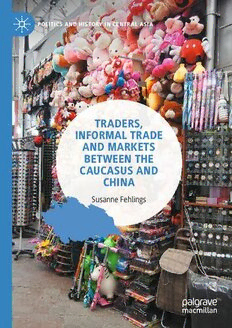Table Of ContentPOLITICS AND HISTORY IN CENTRAL ASIA
TRADERS,
INFORMAL TRADE
AND MARKETS
BETWEEN THE
CAUCASUS AND
CHINA
Susanne Fehlings
Politics and History in Central Asia
Series Editor
Timur Dadabaev, University of Tsukuba, Tsukuba, Japan
Inthepastfewdecades,CentralAsiahasdrawntheattentionofacademic
and business communities as well as policy professionals because of its
geostrategic importance (being located between Russia and China and
in close proximity to Afghanistan, Pakistan, Iran, Turkey, and India), its
international stability, and its rich energy resources. The region also faces
challenges, such as post-conflict peacebuilding, impacts of the Afghan
conflict,anumberofrecentinter-ethnicconflicts,andpost-Socialistdevel-
opment paradigms. Approaching the problems and issues related to this
region requires a multi-disciplinary perspective that takes into account
political science, international relations, political economy, anthropology,
geography, and security studies. The Politics and History in Central Asia
series serves as a platform for emerging scholarship on this understudied
region.
Susanne Fehlings
Traders, Informal
Trade and Markets
between the Caucasus
and China
Susanne Fehlings
Frobenius-Institut
Frankfurt am Main, Germany
Politics and History in Central Asia
ISBN 978-981-19-5204-3 ISBN 978-981-19-5205-0 (eBook)
https://doi.org/10.1007/978-981-19-5205-0
© The Editor(s) (if applicable) and The Author(s), under exclusive license to Springer
Nature Singapore Pte Ltd. 2022
This work is subject to copyright. All rights are solely and exclusively licensed by the
Publisher, whether the whole or part of the material is concerned, specifically the rights
of translation, reprinting, reuse of illustrations, recitation, broadcasting, reproduction on
microfilms or in any other physical way, and transmission or information storage and
retrieval,electronicadaptation,computersoftware,orbysimilarordissimilarmethodology
now known or hereafter developed.
The use of general descriptive names, registered names, trademarks, service marks, etc.
in this publication does not imply, even in the absence of a specific statement, that such
namesareexemptfromtherelevantprotectivelawsandregulationsandthereforefreefor
general use.
Thepublisher,theauthors,andtheeditorsaresafetoassumethattheadviceandinforma-
tion in this book are believed to be true and accurate at the date of publication. Neither
the publisher nor the authors or the editors give a warranty, expressed or implied, with
respecttothematerialcontainedhereinorforanyerrorsoromissionsthatmayhavebeen
made.Thepublisherremainsneutralwithregardtojurisdictionalclaimsinpublishedmaps
and institutional affiliations.
Cover credit: © Susanne Fehlings
This Palgrave Macmillan imprint is published by the registered company Springer Nature
Singapore Pte Ltd.
Theregisteredcompanyaddressis:152BeachRoad,#21-01/04GatewayEast,Singapore
189721, Singapore
Praise for Traders,InformalTrade
andMarketsbetweentheCaucasus
andChina
“Dr. Fehlings’ book is an important step towards a historical economic
anthropology of everyday economic action, because she succeeds excel-
lently in making this everyday action transparent in its diversity and its
historical plasticity.”
—Werner Plumpe, Professor of Economic History, Goethe University,
Germany
“Why and how do Georgian and Chinese traders travel across Eurasia
withoutanyformalinstitutionalsupportandwhatconsequencesarethere
of such ‘globalization from below’ for economy, markets, sociality and
materiality?
Susanne Fehlings’ ethnography skilfully explores the structural condi-
tions, background and everyday lives of such traders and businessmen,
scrutinizes their activities, narratives and logics of action and offers a
rich anthropological discussionembedded in historical, legal and political
contexts. ”
—Lale Yalçın-Heckmann, Docent for Social Anthropology, University of
Pardubice, Czech Republic
v
Contents
1 Introduction: Markets, Trade, and the Study
of the Post-Soviet Economy 1
Marketplaces and Long-Distance Trade in Anthropology 9
Post-Soviet Markets and Their Background 13
Markets and Trade in Post-Soviet Economies 16
Fieldwork and Data Collection 18
Structure and Argument of the Book 22
References 27
2 From Chelnoki (Shuttle Traders) to Biznesmeny 37
Chelnoki 38
Biznesmeny and the Bazaar 44
Biznes in “Russian Beijing” 50
The Social Life of Biznes 70
Biznes Culture and Its Rules 82
Conclusion 88
References 90
3 Caucasian Biznes, Local Trade, and Entrepreneurship 97
Business Parameters 101
Location and Types of Commerce 102
Personal Background 116
Social Networks 130
Mobility 142
vii
viii CONTENTS
Goods 146
Quantity, Transport, and Frequency 150
Putting the Parts Together 151
Ideology: Ideas, Beliefs, and Value Systems 158
Entrepreneurs in Local Ecosystems 161
Conclusion 174
References 175
4 Dealing with Institutional Frameworks 187
Loans 191
Lending by Private Credit Agencies (the Example of BIG) 192
Microfinance and the Banking Sector 199
Traders as Clients 205
Bureaucracy 208
Customs Clearance 210
Digitalization 218
Legislation 222
From Shevardnadze to the Rose Revolution 223
Law Versus Alternatives 225
Law’s Impact on Trade 230
Assessments of the State 232
Conclusion 239
References 241
5 Chinelebi: Chinese Entrepreneurs in the Caucasus 249
The Chinese Market at Lilo Bazroba 252
Hualing City and Sea Plaza 256
The Chinese Presence in Georgia 263
Globalization with a Chinese Face 266
The Georgia-China Partnership 272
Chinese-Georgian Encounters on the Ground 279
Hualing Group as Employer 281
Hualing’s Encounters with Georgian Formal Institutions 288
Analysis of Chinese Activities in Georgia 292
“Cultural Brokers” and “Guanxi” 295
“Encompassing Accumulation” 300
CONTENTS ix
Conclusion 301
References 302
Epilogue 309
References 315
Index 345
Note on Language
For the different languages I used different systems for transliteration.
(cid:129) For Cyrillic into Latin characters the ISO 9 (1995) system, except
forestablishedwritingsofnames(e.g.,CherkisovskyRynok)andthe
term “chelnoki”.
(cid:129) ForGeorgianintoLatincharacters,withthehelpofZakhariaPourt-
skhvanidze, the ISO 9984 system, except for established writings of
names and places.
(cid:129) For Armenian into Latin characters the ISO 9985 system.
(cid:129) The Chinese characters are copied from the characters used in
literature.
xi

